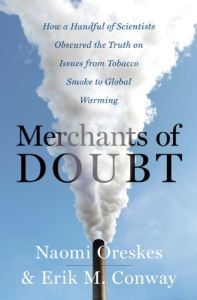Join getAbstract to access the summary!

Join getAbstract to access the summary!
Naomi Oreskes and Erik M. Conway
Merchants of Doubt
How a Handful of Scientists Obscured the Truth on Issues from Tobacco Smoke to Global Warming
Bloomsbury Press, 2010
What's inside?
Brilliant investigation of right-wing scientists who fight against scientific truths about tobacco, acid rain, ozone depletion and global warming
Recommendation
“As recently as 2007, 40% of Americans believed that scientific experts were still arguing about the realities of global warming.” And, of course, they were not; global warming is a long-acknowledged, scientific fact, say science professor Naomi Oreskes and science writer Erik M. Conway. They present their case that “merchants of doubt” – a dedicated cabal of conservative scientists on the payrolls of industries and right-wing think tanks – have labored successfully over the decades to convince a broad spectrum of the public that the truth is not true, that scientific fact is merely opinion, that secondhand smoke will not kill you, that industrial pollution did not cause acid rain, that chlorofluorocarbons (CFCs) did not deplete the ozone layer and that global warming does not exist. In this jaw-dropping, meticulously researched work of science, politics and investigative journalism, Oreskes and Conway track the shockingly long history of widespread, willful dissemination of scientific fiction in the service of politics and profits. getAbstract recommends this sure-to-be classic to all those interested in the environment, in the processes of politics, science and media, and in learning the hard facts that underlie so much propaganda.
Summary
About the Authors
University of San Diego history and science studies professor Naomi Oreskes wrote “Beyond the Ivory Tower,” a global warming study in Science. Erik M. Conway has written four books, among them Atmospheric Science at NASA: A History.


















Comment on this summary